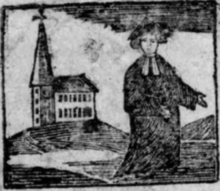John Seccombe

Rev. John Seccombe (25 April 1708-27 October 1792) was an author, a founder of Chester, Nova Scotia and was “the best-known and most highly respected clergyman in Nova Scotia.”[1] [2][3]. He was also the author of Father Abbey's Will, which was printed as a poem and a broadsheet over 30 times throughout the 18th century in England and America.[4] According to the Manual of American Literature, the poem "was one of the best comic poems of that day."[5] As a result of the poem, the History of American Literature indicated that Seccombe "had an extraordinary notoriety" in America's early literary history.[6]
Career
Seccombe graduated Harvard College (1728) and then became the first minister of the town of Harvard, Massachusetts, where he stayed for 25 years (1733 -1757). [7] He left Massachusetts and helped establish Chester, Nova Scotia with Timothy Houghton (1759). He also preached at St. Matthew’s Church in Halifax. He ordained the first Presbyterian minister in British North America Bruin Romkes Comingo.[8]
In the wake of the American patriot rebellion in the Siege of Fort Cumberland, in 1776, along from other members of St. Matthew's Church, Seccombe was arraigned by the Nova Scotia Council for having American patriot sympathies.[9]
As an author, Seccombe’s best known work is “Father Abbey’s will” (1732), a 15 stand nonsense verse, which was turned into a Broadside ballad and published many times. The name Abbey was a misnomer for Matthew Abdy, a custodian of the town, and the poem listed an inventory of Abdy's estate. The poetic composition was first published in Weekly Rehearsal (Boston, Mass.), 3 Jan. 1732.[10] He was re-published in the Gentlman's Magazine, May 2, 1732 and London Magazine (October 1732) and continued to be re-published throughout the 18th and 19th century.[11] The song was anthologized in Louis Untermeyer's Early American Poets (2001).
In 1769, Seccombe baptized slaves at St. Matthews.[12]
He went on to write the eulogies for the wives of Jonathan Belcher and Benjamin Green.
He died at his home on Seccombes Island, west of Chester.
Legacy
- namesake of Seccombes Island, Nova Scotia[13]
See also
References
- ↑ Cahill, Barry, "The Sedition Trial of Timothy Houghton: Repression in a Marginal New England Planter Township during the Revolutionary Years". XXIV, 1 (Autumn 1994), p.39
- ↑ Canadian Biography - John Seccombe
- ↑ New England Life in the Eighteenth Century: Representative Biographies from ... By Clifford Kenyon Shipton, p. 286
- ↑ Music in Colonial Massachusetts, pp. 344-347
- ↑ A Manual of American Literature: A Text-Book for Schools and Colleges By Hart (John Seely), John Seely Hart, 1873, p.52
- ↑ A History of American Literature, p.46
- ↑ Nourse, Henry S. (1894). History of the Town of Harvard, Massachusetts 1732-1893. Clinton, Massachusetts: Warren Hapgood. p. 178. Retrieved 7 October 2018.
- ↑ Bruin Romkes Comingo. p. 281
- ↑ Collections of the Nova Scotia Historical Society, p. 164
- ↑ Image of woodcut from Father Abbey's will
- ↑ See European Magazine, May 1781
- ↑ p. 134
- ↑ https://archive.org/details/placenamesofprov00browuoft/page/n134
Texts
- George T. Goodspeed. "Father Abbey's Will". Proceedings of the Massachusetts Historical Society. Third Series, Vol. 73 (1961), pp. 18-37
- Gwendolyn Davies, "Poet to Pulpit to Planter: The Peregrinations of the Reverend John Seccombe", in Margaret Conrad, ed., Making Adjustments: Change and Continuity in Planter Nova Scotia 1759-1800 (Fredericton, 1991), p.. 189-97.
- John Seccombe. Father Abbey’s will. (1732)
- “The diary of Rev. John Seccombe,” ed. C. B. Fergusson, PANS Report (Halifax), 1959, app.B, 18–45 (the original is in PANS, MG 1, 797C);
- A sermon preached at Halifax, July 3, 1770, at the Ordination of the Rev. Bruin Romeas Comingoe. To the Dutch Calvanistic Presbyterian Congreagation at Lunenburg ... Being the first preached in the Province of Nova Scotia, on such an occasion. To which is added an Appendix.
- A sermon occasioned by the death of the Honorable Abigail Belcher, late consort of Jonathan Belcher, esq . . . delivered at Halifax . . . October 20, 1771 with an epistle by Mather Byles (loyalist) (Boston, Mass., 1772);
- A sermon, occasioned by the death of Mrs. Margaret Green; consort of the late Honourable Benjamin Green, esq; delivered at Halifax, in the province of Nova-Scotia, February 1st, 1778 (Halifax, [1778?)]
- Father Abby's Will. edited by John Langley Sibley. 1854.